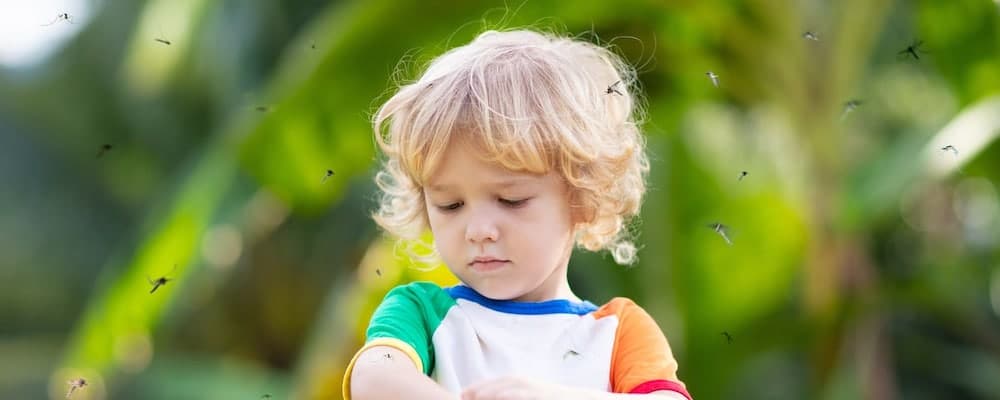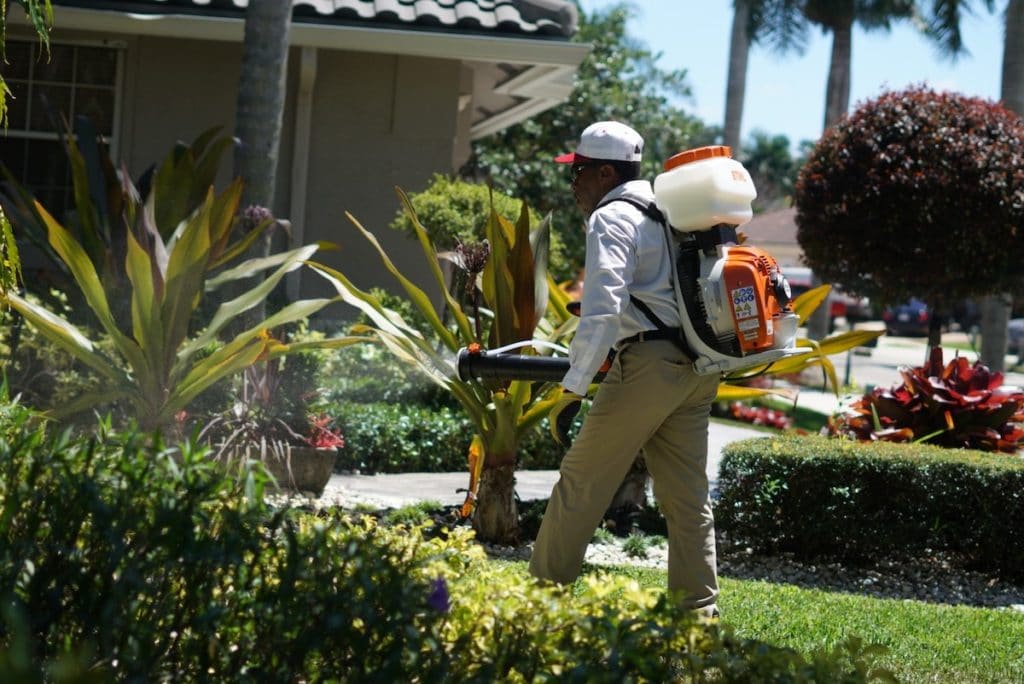
Florida is ranked as one of the worst states when it comes to mosquitoes. These annoying pests appear as soon as the temperature hits 50 degrees or higher, and due to Florida’s naturally warmer climate conditions throughout the year, our mosquito season can begin as early as February. That means for areas like Broward, Miami-Dade, and Palm Beach, once summer hits, mosquitoes have already been breeding for several months and can easily overtake indoor and outdoor spaces.
Where Do Mosquitoes Breed?
Aside from South Florida’s warmer temperatures, mosquitoes need water to reproduce, and not a lot of it. Even a tiny bottle cap can become a breeding site as long as the water in it remains stagnant for a week or more. Here are some common areas to regularly check for standing water as a preventative measure:
- Yard Debris – From old tires and wheelbarrows to paint buckets and hollow tree stumps, there are many places that water can collect and sit, especially after some rain. Be sure to remove these items from your yard, or if you can’t, turn them over or cover them so that water cannot collect in their crevices.
- Pools, Bird Baths, and Ponds – For many South Florida families, mosquitoes season starts long before the swim season, giving mosquitoes time to breed in untreated, exposed pool water. Ensure that pools are carefully covered and that the water in birdbaths or small ponds is either changed frequently or populated with a few mosquito-eating fish.
- Flower pots, Tall Grass, and Shrubbery – Ensure that flower pots are not over-watered and have proper drainage. Weeds, tall grass, and overgrown brush can also shelter small puddles of water from evaporation and should be kept low in warmer months.
- Clogged Drains and Gutters – It’s easy to forget about these areas once they aren’t causing any issues, but mosquitoes can hide in little pockets of water under rain gutter debris.
- Don’t Forget About the Indoors – Have you ever been annoyed to find mosquitoes singing in your ear while you’re in the bathroom? Mosquitoes breed just as quickly indoors as they do outdoors. Don’t allow water to sit under sinks or in buckets for days at a time.
We recommend doing a complete walkthrough of your property to find places where water can collect. This is especially effective after rainfall, but be sure to exercise caution as some surfaces will become more slippery and unsafe to navigate.
Why Do Mosquitoes Seem More Attracted to Me?
While a mosquito problem can make enjoying the outdoors very difficult, some persons appear to get bitten more than others. Some factors that may affect mosquito behavior and increase the risk of being bitten include:
- Sweat – As it gets closer to the peak heat of summer, persons who sweat more might find mosquitoes drawing close due to the moisture on their skin.
- Body Temperature – Mosquitoes are drawn to heat and warmer temperatures, so the higher your body heat, the more likely they are to seek you out.
- Dark Clothing – Mosquitoes appear to be attracted to bold colors and darker clothing, possibly because it is easier for them to see. Dark clothing can also trap heat and increase the likelihood of sweat, which further interests them.
- Carbon Dioxide – Mosquitoes are, annoyingly enough, attracted to the carbon dioxide the body produces each time we exhale. Exercise increases sweat, body temperature, and the amount of carbon dioxide we produce.
- Noticeable Scents – Just as certain flowers attract mosquitoes rather than repel them, some floral scents can easily catch mosquitoes’ attention.
There are several other biological and genetic factors that can increase bite risk, such as being pregnant, having higher potassium, and having type O blood. While scientists are not yet sure of the reason behind all these, persons in these categories must take extra steps to protect themselves from the diseases and viruses that mosquitos in Florida carry.
Which Diseases Do Mosquitoes Carry?
There are dozens of mosquito species spread between South Florida and the rest of the state, but some of the most common and dangerous variants also carry diseases that can be life-threatening or fatal. Here are some that mosquito-borne diseases that have affected Floridians within the last few years
- Dengue – Transmitted by the Yellow Fever Mosquito or Aedes aegypti, dengue not only causes flu-like illness, nausea, vomiting, aches, and pains but can have long-term effects such as fatigue and hair loss.
- Zika – Transmitted by the Asian Tiger Mosquito (Aedes albopictus), this terrible virus can be transmitted via bodily fluids, as well as from mother to child, resulting in birth defects and abnormalities. Symptoms of this virus include fever, headache, rash, and joint and muscle pain.
- Malaria – Spread by the bite of the Anopheles Mosquito, like dengue, malaria can cause flu-like symptoms plus fatigue, nausea, chills, aches, and pains. It can also lead to anemia and jaundice due to the effects of the malaria parasite on the body’s circulatory system.
- West Nile Virus – Active in Florida since 2001, this mosquito-borne illness can be particularly detrimental to persons over 60. Spread by the Culex species of mosquito, when symptomatic, it can result in headaches, high fever, disorientation, and even paralysis.
- Eastern equine encephalitis – This mosquito-borne infection is particularly dangerous because it doesn’t just affect humans, but livestock, pets, and surrounding wildlife. Spread between Culiseta melanura mosquitoes and birds, this illness can cause inflammation of the brain and be fatal.
How Can I Get Rid of Mosquitos?
Mosquito control requires constant vigilance and prevention measures. While it is possible to minimize their presence indoors and in your yard, unless neighbors also take the initiative to clear out breeding areas and practice mosquito pest control, there is always a chance that they will return.
Fortunately, with the correct measures, you can enjoy spending time outdoors in the South Florida spring and summer seasons without being overrun by these annoying insects and bug bites.
- Stop Mosquitoes from Getting Inside – By adding mosquito nets to your doors and windows, you can stop more mosquitos from getting indoors and finding breeding spots.
- Check for Breeding Spots – Regularly do a complete run-through of your indoor and outdoor areas to ensure there are no new places for mosquitos to start breeding.
- Use Plants – Some plants and flowers like lavender, catnip, and basil naturally repel mosquitos.
- Use Traps – Consumer-grade mosquito traps can take care of small areas.
- Hire A Professional – While the measures listed can be effective, they can take days or weeks of careful monitoring to work. By getting professional mosquito removal, it is easier to take preventative measures as mosquitos will not already be in your home.

Professional Mosquito Treatment by Gregory’s Pest Control
The safest, most effective way to eliminate and repel mosquitoes from your Florida home is to get a full-service treatment from a professional mosquito and pest control provider.
Gregory’s Pest Control, based out of Coral Springs, Florida, has over thirty years of experience protecting families in Broward, Palm Beach, and other South Florida areas from mosquito infestations. We also have a barrier protection program to eliminate breeding areas and an advanced maintenance service that sees one of GPC’s expert personnel returning for a checkup every 21-30 days.
Visit our mosquito control services page to get a free quote or schedule a complimentary pest evaluation visit.

Paul Gregory
Owner/President of Gregory’s Pest Control
I’m a 2nd generation pest control owner who started working for my father in 1999. I was raised in South Florida and feel blessed to call it home for my entire adult life. As a long-term Florida resident, I recognize the challenges of controlling the many different pests that thrive in our subtropical climate. In particular, I understand how difficult it can be to prevent pests from invading our homes and businesses. By helping families solve their pest problems so they can live safer, more comfortable lives, I feel I am also meeting my family’s commitment to help our community. When I’m not out fighting pests, you can find me on the golf course or out on a soccer field where I have been fortunate enough to coach soccer to kids of all ages for the past 20 years.




